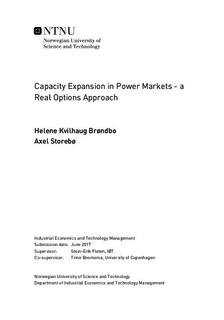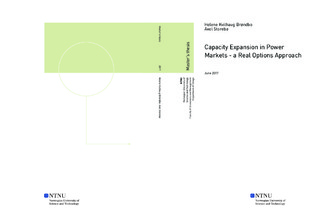| dc.description.abstract | This thesis explores generation capacity expansions in power markets using a real options approach. Our framework considers several features of actual power markets, including time-varying demand and generation technologies with different cost characteristics. We propose a capacity expansion model where the market clearing is determined by equilibrium modelling. Further, we compute the marginal value of additional generation capacity, solve a series of optimal stopping problems and simulate the operation and investment decisions of all market participants over a horizon of several decades.
The thesis consists of two papers applying the framework in different settings. In the first paper, "Electricity Capacity Expansion in a Cournot Duopoly", we examine a duopoly where base and peak load power plants are available to the investor and compare it to a market governed by a central planner. We find that both imperfect competition in the market and a time-varying demand boost peak load investments. In a numerical example, we notice that welfare losses from producers exercising market power exceed 10 \%.
The second paper, "A real options approach to generation capacity expansion in imperfectly competitive power markets", is our main contribution to the thesis. In this article, we expand our framework to include renewables, rationing and firms with different levels of market power, and we apply it to the German power market. We find that the need for peak load power plants increases with the share of renewables. Without monetary incentives, gas-fired power plants are not profitable for merchant investors. When all types of gas-fired power plants receive capacity payments, investments in combined cycling power plants occur at the expense of investments in renewables. Hence, we argue that only peaking power plants should receive capacity payments. This will reduce rationing while making renewable investments profitable. | |

